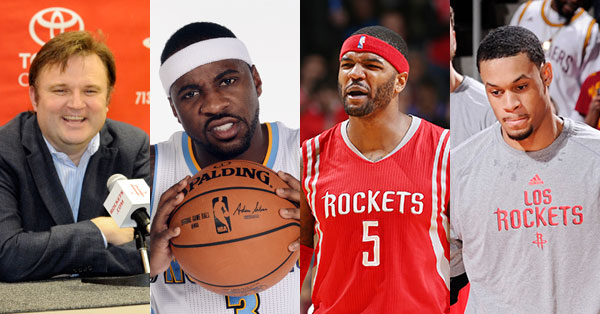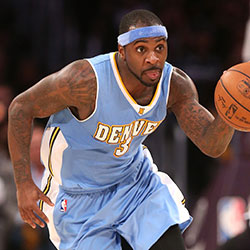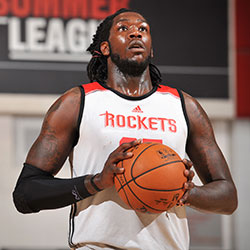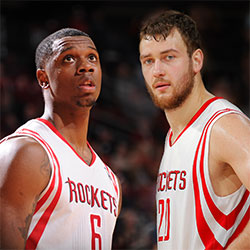Houston Rockets
Houston Rockets Salary Cap Update: 2015 Off-Season Edition
David Weiner breaks down the current salary cap situation for the Houston Rockets after an off-season full of ups and downs,
Published
9 years agoon
It’s been an up-and-down journey thus far for Houston Rockets fans this off-season.
UP: The Rockets pulled in a nice haul in the 2015 NBA Draft, nabbing Wisconsin small forward Sam Dekker with the #18 pick and stealing Louisville power forward Montrezl Harrell with the #32 pick. Mock drafts had Dekker going as high as #8 and rarely lower than #15; and most mocks had Harrell as a sure-fire first round pick.
DOWN: Not long after the draft, word came out that Spanish star point guard (and 2009 second round pick) Sergio Llull had elected not to accept a contract offer from Houston, believed to be for a substantial portion of the Non-Taxpayer Mid-Level Exception (MLE). One of the world’s best players outside the NBA, Llull represented a potential solution to the Rockets’ point guard troubles. But, alas, it was not meant to be this summer. (Note: Llull has since reportedly agreed to a contract extension with Real Madrid that might actually lower his NBA buyout amount for next summer.)
UP: Early in the July Moratorium, the Rockets agreed to terms on new deals with Corey Brewer (three years, $23.4 million) and Patrick Beverley (four years, $23 million). Both signed contracts that decline in salary each year. Brewer’s starting salary is the maximum amount Houston could sign him to with Early Bird rights; and his total contract pays him the exact same amount as Trevor Ariza over the next three years. The fourth year of Beverley’s deal (at just over $5 million) is fully non-guaranteed. Given the contracts that have been handed out this summer, both deals were largely viewed as reasonably good value.
DOWN: On July 4, the league’s premier (departing) free agent, LaMarcus Aldridge, announced that he was joining the San Antonio Spurs, shunning the Rockets’ bid for him. A key reason for the speedy agreements with Brewer and especially Beverley (a restricted free agent) was to prove to Aldridge that Houston would be fielding a competitive roster. It is believed that the Rockets were attempting to acquire Aldridge via sign-and-trade using a package centered around Jason Terry (to be signed-and-traded via his Bird rights), Kostas Papanikolaou (and his non-guaranteed contract) and young players and/or draft picks.
UP: The Rockets added veteran shooting guard Marcus Thornton on a one-year veteran’s minimum deal. While not much of a defender, Thornton is expected to provide much-needed three-point shooting to a team that utilizes the three-point shot more than any other team. He is also capable of the occasional scoring outburst.
DOWN: Seeking a more defined role in advance of hitting free agency again in 2016 (and probably also a little miffed that the Rockets were not willing to use their MLE on him), Josh Smith bolted Houston for the Los Angeles Clippers after endearing himself to Rockets fans during the team’s recent playoff run.
UP: The Rockets agreed to a new deal with restricted free agent K.J. McDaniels (three years, $10 million, using a portion of the MLE). The McDaniels contract includes a team option in Year 3; and by virtue of signing him outright (rather than waiting to match an offer sheet he could have signed elsewhere), the Rockets can trade him without restriction after December 15.
DOWN: Several hours went by following news of the McDaniels signing without the Rockets making another roster move, leaving many fans to be moderately bored for a short period of time. But Houston’s most notable off-season move came later that evening.
UP: Houston pulled off a major trade, acquiring Nuggets star point guard Ty Lawson and a 2017 second round pick in exchange for Papanikolaou, Pablo Prigioni, Joey Dorsey, Nick Johnson, and a lottery-protected 2016 first round pick. In order to make the salaries match in this trade, the Rockets had to renounce their rights to Terry, whose $8.7 million cap hold came off the books, allowing Houston to take back over 150% of its outgoing salary, which is reserved only for teams whose total team salary (including players’ cap holds) does not exceed the luxury tax threshold upon completion of the trade.
The downside risk of acquiring Lawson — who not long ago was arrested for his second DUI this year — was mitigated by several factors. None of the players traded to Denver were in the Rockets’ rotation. The 2016 first rounder immediately converts to a 2017 second rounder (via Portland) if the Rockets somehow miss the playoffs this season. But most notably, Lawson agreed to make the final year of his contract (for over $13.2 million) fully non-guaranteed, essentially making it like a team option for Houston (although, unlike with a “real” team option, the Rockets would not have any Bird rights to Lawson next summer if they waived him). At worst, the Rockets will have wasted a draft pick and some money on a troubled point guard. At best, Lawson can be that second ball-handler and shot creator the Rockets desperately missed in their recent playoff run.
With those ups and downs out of the way (and with more sure to come), it’s time to once again take a look at the team’s salary cap situation and where the Rockets can go from here.
Player Salary, Exceptions and Available Cap Room
The Houston Rockets currently have the following player salary commitments, cap holds and salary cap exceptions available for the 2015-16 season:
Player salary commitments: Dwight Howard ($22.36 million), James Harden ($15.76 million), Lawson (12.4 million), Brewer ($8.23 million), Ariza ($8.19 million), Beverley ($6.49 million), McDaniels ($3.19 million), Terrence Jones ($2.49 million), Donatas Motiejunas ($2.29 million), Dekker ($1.65 million), Clint Capela ($1.24 million) and Thornton ($947,276).
Cap holds: None.
Other Salary Cap Exceptions: Houston has some small trade exceptions from the Alexey Shved ($1.62 million), Isaiah Canaan ($816,482) and Troy Daniels ($816,482) trades.
The Rockets used a portion of the MLE — which can be either the Non-Taxpayer MLE ($5.464 million) or the Taxpayer MLE ($3.376 million) — on McDaniels. If Houston elects to use the Non-Taxpayer MLE (of which they will have about $2.27 million remaining) this season, it will be subject to a hard cap at the “apron” level of $88.74 million.
The maximum team salary (or “soft” salary cap) for 2015-16 came in at $70 million, with the luxury tax threshold coming it at $84.74 million, both numbers a little higher than projected. However, based on their existing salary commitments (totaling over $85.2 million thus far), the Houston Rockets are officially over the luxury tax threshold.
More Moves Coming
With the Rockets already in tax territory, they need to be very careful about their next moves; but with only 12 players under contract, they still need to add to their roster in advance of training camp in a couple of months.
Reports are that Houston has agreed to terms with former Rocket Chuck Hayes on a one-year (partially guaranteed) veteran’s minimum deal to re-join the franchise that gave him his NBA start. Assuming that Hayes makes the roster and is not waived before January 10 (when all NBA contracts become fully guaranteed), Hayes will make nearly $1.5 million this year based on his years of service in the league; however, by signing Hayes to a one-year deal, the Rockets will only have to pay him the two-year veteran’s minimum salary ($947,276, which will also be his cap hit), with the league picking up the tab for everything above that amount. (Thornton is in a similar situation on his one-year deal, getting paid nearly $1.2 million, with only $947,276 of that coming from Houston.)
There are also reports that the Rockets have extended a contract offer to Terry, presumably also a one-year veteran’s minimum deal. While Terry may still be negotiating for a second year on his deal, that concession could be costly to the Rockets, both this season and next. Terry’s minimum salary (like Hayes) is nearly $1.5 million this year; however, for two-year minimum deals, the team is on the hook for the player’s full salary (and the cap hit would match that salary). Signing a two-year deal with Terry would cost the Rockets an extra $1.38 million this season in salary and luxury tax than what they’d pay for a one-year deal, let alone the salary commitment for 2016-17.
Shortly after the draft, it was reported that the Rockets had reached an agreement to sign undrafted free agent Christian Wood to a contract. Presumably, it is a two-year minimum deal with a partial guarantee. Although his rookie minimum salary would be $525,093, for purposes of determining whether the Rockets are over the luxury tax threshold or the apron level, his cap figure will be the two-year veteran’s minimum salary ($947,276).
Because the Rockets are over the luxury tax threshold, each veteran’s minimum signing will cost owner Les Alexander at least an extra $1.42 million in luxury tax (or more, if an older vet is signed to a two-year deal), on top of the player’s actual salary.
The Curious Case of Montrezl Harrell (and the MLE)
Probably the most intriguing roster move may relate to what the Rockets do with Harrell. As a high second round pick, Houston ideally would like to sign him to a three- or four-year deal paying above the minimum salary using the MLE. Some players drafted shortly after Harrell have received some relatively sizable contracts, such as #33 pick Jordan Mickey (four years, $5 million, presumably with over $3 million guaranteed) and #36 pick Rakeem Christmas (four years, $4.3 million, with $3.15 million guaranteed).
Unfortunately, while Houston still has more than enough remaining of the Non-Taxpayer MLE to give Harrell a similar deal, the Rockets are dangerously close to the apron level, where they would be hard-capped if that MLE were used. Assuming that Terry, Hayes and Wood are all added on minimum deals, the Rockets would only have enough space to pay Harrell about $665,000 in Year 1 of an MLE deal without salary being cut elsewhere. This would also limit the Rockets’ ability to add any more salary, even for 10-day contracts and other minimum salary signings. The hard cap is truly a HARD cap.
For these reasons, it seems that the likeliest course of action (barring a trade involving Harrell or otherwise freeing up a meaningful amount of salary) would be to sign Harrell to a one- or two-year rookie minimum deal. However, Harrell does not have to accept a two-year minimum deal if he does not want to. He could instead opt to accept a one-year non-guaranteed contract for the rookie minimum — the required minimum tender for the Rockets to retain his NBA rights — and become a restricted free agent next summer. This was the same strategy used by McDaniels last year with the Philadelphia 76ers, and that strategy clearly paid off for K.J. this summer. But McDaniels had the benefit of assured playing time on a horrendous Sixers team, whereas Harrell will likely be relegated to the D-League for most of this season, with no assurances of NBA playing time on a talent-laden Rockets roster.
With Harrell not being signed to an MLE deal, the Rockets would be free to sign as many minimum contracts as they wish in order to fill out their training camp roster and would be free to make trades taking back additional salary (although they will likely be limited to the 125% matching rules for taxpaying teams). Of course, any additional salary would still be subject to payment of the luxury tax.
To Extend or Not to Extend?
Another key issue on the table for the Rockets this off-season: whether or not to extend the contracts of Jones and/or Motiejunas. Each is eligible for an extension of their rookie contracts, which can be up to four (new) years in length and at up to the maximum salary (based on the new increased salary cap), although odds are that each would get less than that on an extension.
As Bobby Marks wrote about recently, Jones and Motiejunas could be two of the most highly coveted free agents next summer. With the vast majority of teams expected to have copious amounts of cap room, and with the league mandating a minimum team salary at 90% of the new salary cap, teams will be spending like drunken sailors, out of both desire and sheer necessity.
But even with the imminent threat of them being poached in free agency next summer, it is not expected that the Rockets will take the extension route with either player. If allowed to hit free agency, each would have a much lower cap hold than what he would likely get on an extension or in free agency ($6.22 million for Jones; $5.72 million for Motiejunas). Having those lower cap holds gives the Rockets greater flexibility if they want to pursue another star free agent, such as Kevin Durant in 2016, or other avenues for roster improvement. The Spurs recently used this strategy (electing not to sign Kawhi Leonard to an extension last summer) in order to gain the cap flexibility to sign Aldridge this summer.
Don’t be surprised if the Rockets explore trade scenarios for at least one of Jones or Motiejunas, perhaps for a future draft pick or a power forward with more years remaining on his contract. It is unlikely that Houston can afford (or is otherwise inclined) to re-sign both to large new contracts when both play the same position. On the other hand, the Rockets may just as well be inclined to let both play out the year and go with whichever player best distinguishes himself. Or hell, they could re-sign both. There are options galore on that front.
Conclusion
It has been a pretty wild off-season thus far for the Houston Rockets. With the addition of Lawson, they are positioned as a top title contender this season. While the likely inability to lock up Harrell on a longer-term deal is not ideal, it is a small price to pay for avoiding a hard cap and being able to add to the roster and to make in-season moves. And with a roster lined with veterans on reasonable contracts and first round picks on rookie scale deals, the Rockets have plenty of flexibility going forward, whether via trade, free agency or otherwise.
You may like
Houston Rockets
Podcast: Steven Adams, Mikal Bridges and Trade Possibilities for the Rockets
Published
3 months agoon
February 3, 2024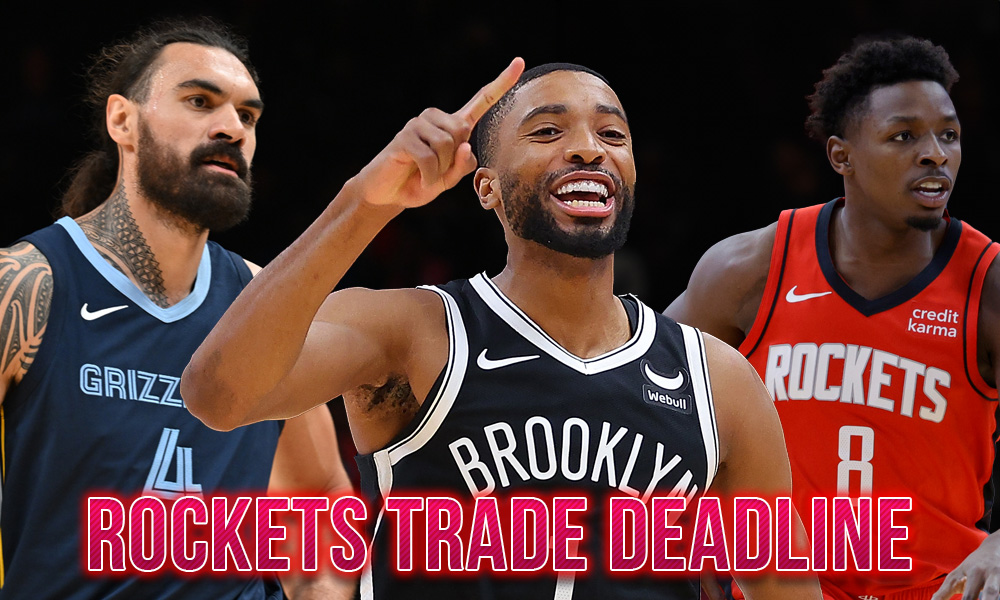
The Houston Rockets already made one deal, acquiring center Steven Adams from Memphis for a handful of second-round picks, but we still have several days left before this Thursday’s NBA Trade Deadline.
Are more deals on the way?
Rumors of interest in Mikal Bridges have swirled, with the Rockets holding precious (and unprotected) first-round picks from Brooklyn. They also could use some help inside this season, which Adams can not provide. Shooting is always in demand.
David Weiner joined Dave Hardisty on the ClutchFans podcast to discuss the Adams trade, its impact on the Rockets in 2024-25 and beyond, the Mikal Bridges rumors, the Brooklyn picks, other trade possibilities and options for Rafael Stone moving forward. Also discussed is the play of Houston’s core 6 prospects: Amen Thompson, Cam Whitmore, Alperen Sengun, Jabari Smith Jr., Tari Eason and Jalen Green.
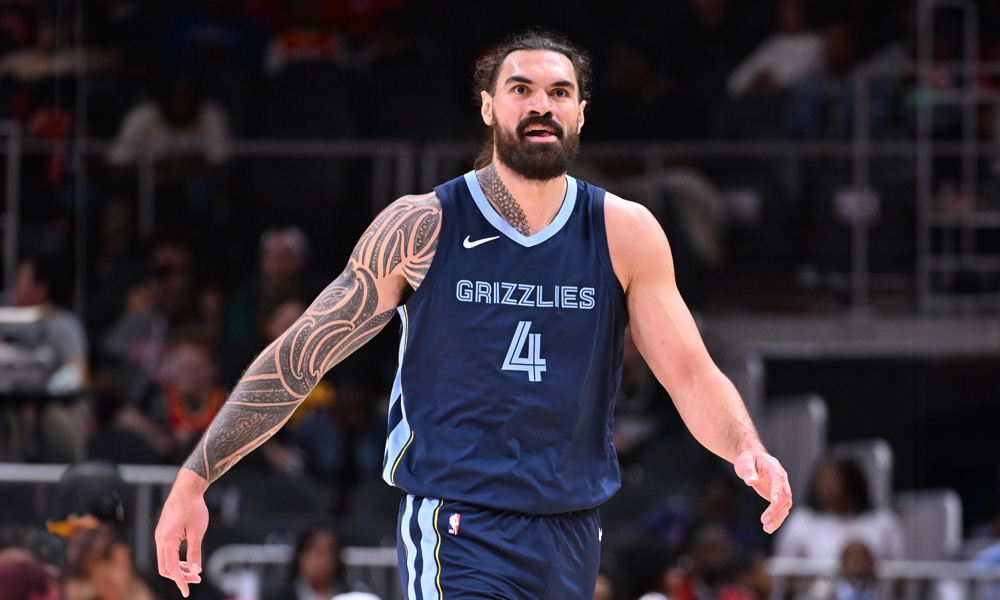
The Rockets made a surprise trade on Thursday, sending the contract of Victor Oladipo and three second-round picks to Memphis for center Steven Adams.
The deal came together quickly and the Rockets had a small window to get it done, hence why this trade was made with a week to go until the trade deadline.
The Price
When you consider that Memphis did this for cost savings primarily and that Adams would not play for any team in the league this season, the price seemed a little high to me. The Rockets gave up the OKC second-round pick this year, which is no big loss, but they also give up the better of Brooklyn’s or Golden State’s second-round pick this season. That’s a pretty good pick (likely in the late 30’s). They also give up the better of Houston’s or OKC’s second-round pick in 2025. If things go as planned for the Rockets, that pick should be in the 45-55 range.
But they didn’t sacrifice a first-round pick, which would have been brutal, and they were not going to use all those seconds this season. So it’s just a matter of opportunity cost — who else could they have gotten for this package?
My understanding is they (particularly Ime Udoka) are very high on Adams.
The Rockets also did this move for cap purposes as well. By moving out the Oladipo contract, which was expiring, and bringing in Adams’ deal, which is signed for $12.4M next season, the window for the Rockets to put together a trade package for a star player is extended out until the 2025 trade deadline. They continue to wait to see which players, if any, shake loose here and become available. They want flexible (see: expiring) contracts that they can combine with assets and this gives them another year to be in that position.
The Trade
It’s not often that the Rockets acquire a player I had not considered beforehand but that’s the case with Steven Adams. The Rockets sorely need a big with size that provides more traditional center strengths, making Clint Capela, Robert Williams, Nick Richards or Daniel Gafford potential candidates, but Adams was overlooked for a few reasons.
First, the 30-year old big man is out for the season after knee surgery cost him the entire 2023-24 campaign, so the Rockets won’t get any benefit from this trade this season. Secondly, Adams is not your traditional center either when it comes to rim protection.
But what Adams does do, he’s really good at and he has some of the same strengths of Brook Lopez, who the Rockets tried to sign in the offseason. Adams is quite possibly the strongest guy in the league and a legitimate 6-foot-11 with a 7-foot-5 wingspan. He’s an outstanding screen-setter, something that could really benefit the likes of Fred VanVleet, Amen Thompson and Jalen Green. He was also an elite rebounder last season, finishing 6th in the league in caroms at 11.5 a game despite playing just 27.0 minutes a contest.
After watching Jonas Valanciunas absolutely bully the Rockets inside on Wednesday, it should be apparent by now to everyone that this was a pretty big need.
In 2021-22, the Memphis Grizzlies finished #2 in the West at 56-26. Their top two players in Net Rating that season were Dillon Brooks (+11.0) and Adams (+8.3), key cogs in a defense that held opponents to 108.6 points per 100 possessions. They’re both now Houston Rockets.
So this adds another trusted vet to Ime Udoka’s rotation.
The question is will the 30-year old Adams return to form after the knee injury? Adams sprained the posterior cruciate ligament in his right knee a year ago, which cost him the end of that season and the playoffs. He tried rehabbing it and it never got better, so surgery became the option just as this season was kicking off.
I like to think the Rockets did their due diligence on that, despite the short time it took for this deal to come together, but that’s unclear.
If he does bounce back, then Udoka has a big man he can turn to reliably in situational matchups or on nights when the younger bigs struggle. He wouldn’t be Boban or even Jock Landale in that scenario — he’s going to play, so the frontcourt depth in 2024-25 should be better. In the end, they got a starting-caliber center who will have no problems coming off the bench, and that’s what they were looking for.
Houston Rockets
On the KPJ trade and future of the Rockets
Published
6 months agoon
October 18, 2023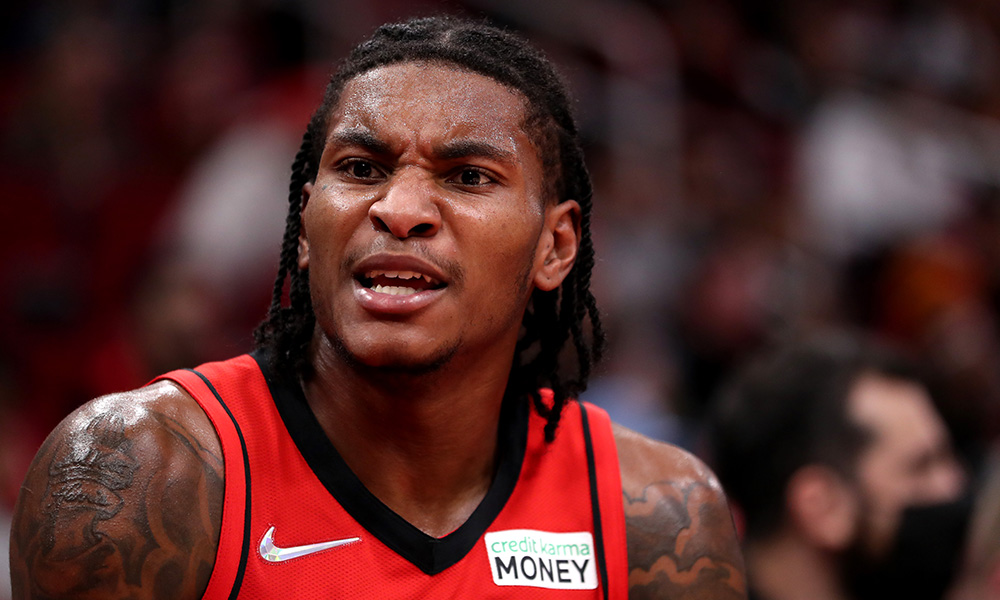
The Houston Rockets are back to being a professional NBA team once again.
The Rockets finally ended the Kevin Porter Jr. era on Tuesday, coughing up two second-round picks in order to unload his contract to the Oklahoma City Thunder, getting back the contract of Victor Oladipo and third-year forward Jeremiah Robinson-Earl. The move puts an end to a long investment and very rocky tenure with KPJ.
David Weiner joined Dave Hardisty on the ClutchFans podcast to discuss the Porter Jr. Experiment, the price paid to move him, Houston’s potential trade options moving forward, the new culture and the current state of the Rockets young core.
Houston Rockets
Heavy investment in Kevin Porter Jr raises serious questions about Rockets front office
Published
7 months agoon
September 20, 2023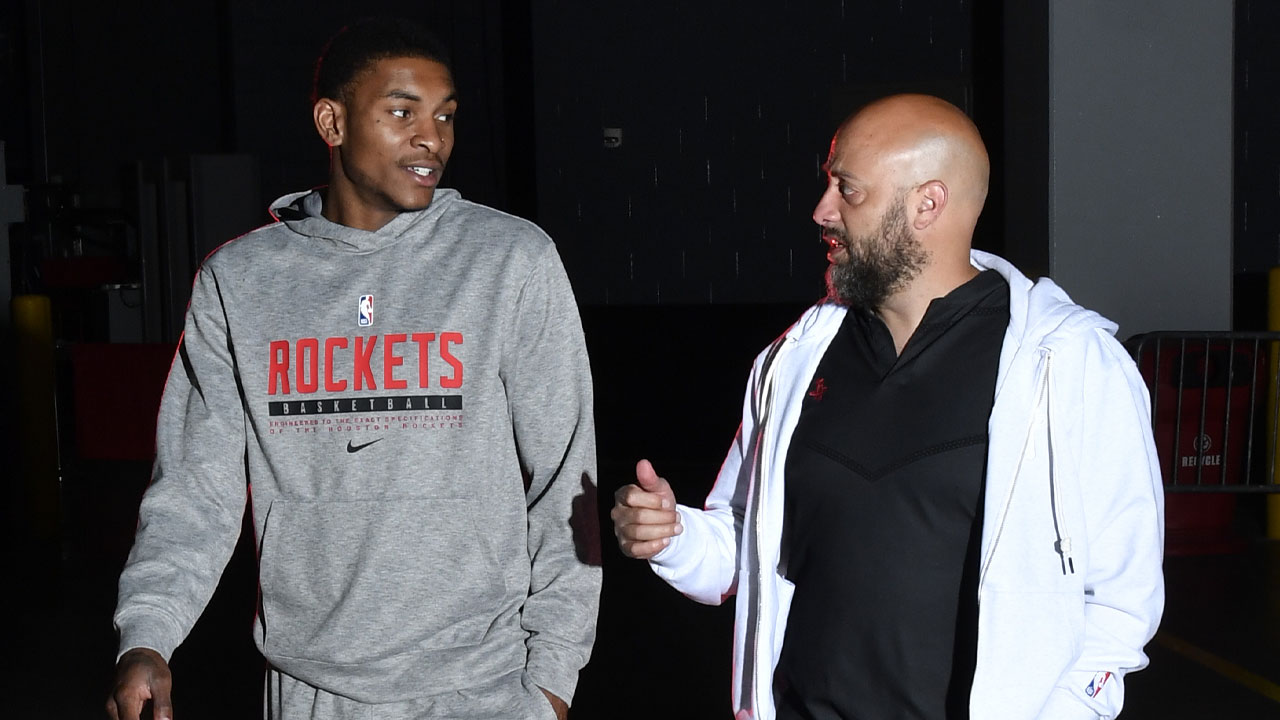
Soon-to-be-ex Rockets guard Kevin Porter Jr was arrested last week for allegedly assaulting his girlfriend, resulting in a fractured neck vertebra and a deep gash above her right eye after an attack at a hotel in New York. He allegedly woke her up by punching her repeatedly, strangled her and did not stop hitting her until she ran out of the hotel room screaming for help and covered in blood.
“This is a serious domestic violence case,” said assistant Manhattan district attorney Mirah Curzer.
First and foremost, I wish the victim healing. I don’t know what to say about the nightmare she went through. She and her family will forever be impacted. As for KPJ, if this is true, he doesn’t belong on the Rockets or in the NBA at all. He belongs in jail.
Secondly, this can’t be overlooked and just swept under the rug: Why did the Houston Rockets bank on and invest so heavily in this guy?
Kevin Porter Jr. being accused of crimes of this severity should not be shocking – at all. Before he even came to the Rockets, he had a long list of serious problems. He was suspended multiple times in high school. In 2019, he had a “conduct issue” significant enough that USC suspended the 5-star recruit indefinitely. He fell to the end of the first round of the 2019 NBA Draft because of his behavior liability. He was accused of punching a woman in the face in Cleveland. He also had a gun and marijuana charge later dismissed after getting into a car crash. He went into a tirade and got into a nasty confrontation with both the Cleveland coach and GM, resulting in the Cavs severing ties immediately and dumping him to the Rockets for nothing.
You could make the argument that initially giving Porter Jr. a second chance in Houston was praiseworthy, but the Rockets experienced KPJ’s anger management and immaturity issues firsthand on several occasions.
Former Rocket Austin Rivers said this week that this isn’t the first, second or even seventh issue with Porter Jr. and that Rockets “higher-ups” confided in him that they had no idea how to handle him.
“I remember talking to guys in the Houston Rockets organization, higher-ups, [and] they were having issues then,” said Rivers. “They were like, ‘We don’t know what to do with him.’ And that’s when he just got there from Cleveland!”
Porter Jr. was routinely a nightmare for Rockets coaches to deal with. On several occasions, he confronted and cussed out members of the coaching staff, saying they didn’t have the “credentials”, per source, a reference to the fact that him playing heavy minutes at point guard was a decision they did not control.
Once at a night out, Porter Jr. had a disagreement with a DJ over music choice and he snapped, smashing the DJ’s laptop to the floor. He needed to be restrained and removed. Rockets personnel and several of Porter’s teammates witnessed the incident.
Curzer also dropped a bombshell at the arraignment in saying that Porter Jr. has a history of abusing his girlfriend, who he had only been dating since early last year, his second season with the Rockets. Curzer specifically cited an incident in which KPJ allegedly rammed his car into hers.
There were dozens of maturity issues visible on the court to anyone paying attention. He refused to check out of games. He got into an argument on the bench with assistant Lionel Hollins. On numerous occasions, he would visibly shut down when he wasn’t passed the ball. I invite you to watch this video from a game against Memphis on March 20, 2022. Just listen to the Grizzlies broadcasters, particularly starting at the 1:40 mark, talk about what they are witnessing here:
Privately, people around the league would say they were baffled by the Rockets continued fascination with Porter Jr. Nobody could understand it.
That fascination starts with Rockets general manager Rafael Stone, who by every account over the last two years was the driving force behind the investment in Porter Jr. It has been no secret. Trading for him in January 2021 was seen by some with the team as his “Harden acquisition”, code for a signature move that makes an executive’s career, much in the way landing James Harden did for Daryl Morey in 2012.
For example, former Rockets head coach Stephen Silas never considered Porter Jr. to be a point guard, per sources — playing him there was a Stone mandate because the GM believed that is where his future lied.
John Wall also told us as much publicly when he explained the phone call he got from Silas about coming off the bench. He said Silas told him “This is what the GM wants,” adding again that Silas said, “Man, you don’t deserve that. You should be the starter. This is just what they want to do.” Wall was upset because he believed KPJ should have to earn the spot.
“I have a hard time finding anybody outside of the Rockets front office that believes that Kevin Porter Jr. is a starting point guard in the NBA,” said ESPN reporter Tim MacMahon in December.
There were plenty of warning signs about KPJ to the public too.
After Porter Jr. got into a heated argument in which KPJ “physically shoved” Rockets assistant coach John Lucas and quit on the team in the middle of a game against Denver in January of 2022, leaving the arena at halftime, Sports Illustrated’s Chris Mannix famously wrote that the Rockets should “Cut Porter Jr. Waive him. Release him. Whatever. Eat what’s left of the $1.8 million he’s owed this season and the $3.2 million he’s got next and move on.” It became a source of mockery for Porter Jr’s fans, a line they would bring up after each game he hit a few threes or handed out some assists.
In February of this year, ESPN’s Jonathan Givony, one of the most connected reporters in the league, flat out warned us that he was hearing awful things about the Rockets culture and locker room. He was blunt in what the Rockets needed to do — waive Kevin Porter Jr. outright and bring in a new coach and GM.
“Just cut him. That’s it,” said Givony of Porter Jr. “And you’re sending a signal to the league that we’re going to do things differently from here on out.”
“When you talk to people around the NBA about Houston, you just don’t hear good things about their culture, about that locker room. You talk to people that are on that team, and they are like, ‘We are a mess’,” said Givony. “Do people want to work with this organization? But you can change that fairly quickly if you come in, get rid of the bad apples and you change the coaching staff, and all of a sudden, you’re Houston. It’s the third-biggest city in America. There’s a history here of you actually being good.”
Porter came to the Rockets for “free” (in exchange for a top-55 protected second-round pick, which was designed not to convey), but he proved far from it as the Rockets continued to pour investment into him. Over the last 2-3 seasons, no Rockets player got more developmental capital than Porter Jr. – not Jalen Green, not Alperen Sengun, not Jabari Smith Jr. The Fertittas paid John Wall $85+ million over two years to sit at home so the team could groom Porter Jr. to be their future point guard.
Then they doubled down. With restricted free agency on the horizon and a seemingly non-existent market for KPJ’s services, the Rockets gave Porter Jr. an extension a year sooner – a contract that was presented as a four-year, $82.5 million deal. The deal was more team-friendly than that, putting team options in it after years 1 and 3. Going from the potential disaster that was initially reported to a deal they could escape after one season felt like a “win”, but the biggest question was why they wanted him long-term at all. The unprecedented nature of a contract that size with that kind of club control clearly showed the Rockets knew there was unique and significant risk here.
After KPJ signed the extension, The Athletic’s Kelly Iko summarized the Rockets view of Porter Jr. – “As has been [their] stance for months, the Rockets have maintained the notion that Porter is a priority and is considered a huge part of their core, along with Green and Jabari Smith Jr.”
The Rockets actions to kick off the 2022-23 season showed exactly that – that he was a priority. They benched Sengun to start the season, in large part to give KPJ a “lob threat” and defender in the starting lineup. They gave him the superstar “Harden Locker”. They introduced him last in the starting lineups. They treated him as the star and empowered him to be the self-proclaimed “Head Honcho” of Clutch City.
But the extension proved unwise and foolish. Porter Jr. never even made it to the first year of it. With over $80 million on the line, he snapped again. The Rockets signed him to one of the team-friendliest deals ever and still managed to both overcommit and overpay as Stone now scrambles to attach real assets to it to get another team to take it off his books.
Is it fair to question the judgment of the Rockets front office? Absolutely and without question. Whether you look at their ability to value character, evaluate risk, scout basketball, build culture, manage assets or allocate development resources, they failed at every level here. Why didn’t they act sooner? Why did they double down? Why didn’t they hold him accountable? Why did everybody in the league see it but them?
“We value the player and the person that [Kevin Porter Jr.] is becoming and are eager to invest in him and his journey,” said Stone after rewarding him with the extension less than a year ago.
The question you have to ask yourself now is, with all they knew and witnessed about Porter Jr. both on and off the court — why were they eager at all?
Houston Rockets
Three predictions for an important Rockets offseason
The 2023 offseason is critical for the Houston Rockets and here’s what we think will happen
Published
1 year agoon
April 6, 2023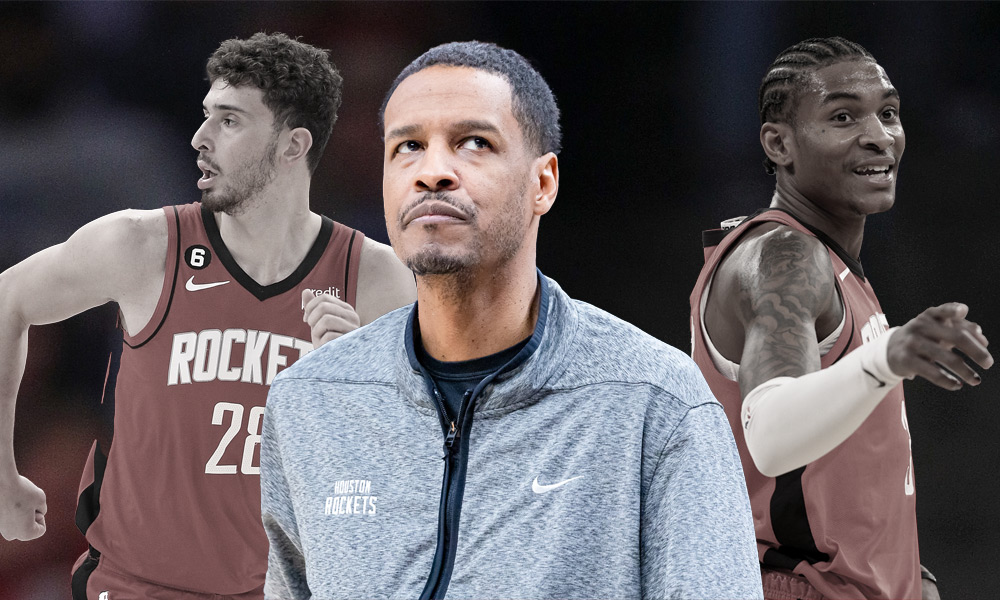
We have almost arrived to the oasis.
For over two years, the “2023 Offseason” has been circled on the calendar as the turning point, the time when the Houston Rockets will switch gears and make winning a priority. With potentially $60 million in cap room and a top draft pick coming, this is the moment of truth that Rafael Stone and the Rockets front office pitched to the Fertittas when the rebuild began.
Does that mean the Rockets are going to magically start winning next season? Not necessarily. But it does mean we won’t see Daishen Nix run the point for 36 minutes in the name of player development. They want to win.
It’s very tough to know what will happen this offseason, given the unknown variables. The Rockets could land a top-two pick, which would bring them Victor Wembanyama or Scoot Henderson, radically boosting their future. James Harden could opt to return, which also significantly boosts their near-term prospects.
But regardless of whether or not luck presents a “lifeboat” (Harden, Wemby, Scoot), here are some things I believe will happen.
Also, if you have been joining us in RocketsWatch all season, first of all, thank you! We greatly appreciate all the fan support this season. But if you’ve stuck around through a tough season, you know that none of this will come as a surprise. I have been talking about these predictions since January.
1. Rockets, Stephen Silas Will Part Ways
Stephen Silas is going to be let go this offseason.
The original plan was for Silas to coach this season and start the next, getting a shot once the Rockets were making winning their top priority. But the bar was low this season and he still fell short. There were several times where the team needed a stronger hand and it wasn’t there. The roster wasn’t built to win, but there is no argument to be made that coaching did anything to enhance the situation.
It’s important to point out that Silas got a raw deal, coming to Houston under different circumstances expecting to coach a veteran team. But this is the hand that was dealt and the Rockets have to play it. Silas may be a fine coach, but he’s not the right coach for this team and that’s all that matters at this stage.
Ownership was ready to move on by midseason, but a variety of factors have led to him finishing the year. But this is going to be it. They sorely need fresh eyes and a different voice.
Confidence Level: 100%
2. The Kevin Porter Jr. Starting Point Guard Experiment Will End
The Rockets got Kevin Porter Jr. for free from the Cleveland Cavaliers in 2021, but he’s been anything but since.
Houston paid nearly $100 million to John Wall to stay at home so they could groom KPJ as their future point guard. They also signed Porter Jr to a team-friendly four-year deal despite the fact that a much more team-friendly restricted free agency was on deck.
Porter Jr. has gotten better and more comfortable at the lead guard spot in two-plus seasons, which could bode well for his future here, but it’s not near enough. He lacks ability to make advanced reads, which is one of the reasons the Rockets are dead last in corner three-point attempts. His tendency is to isolate, which is his strength, and that can create a lot of selfish basketball. In essence, the Rockets have been starting a pair of shooting guards.
The Rockets love them some KPJ, particularly Stone, so I’m not saying he’s done here. He could thrive in an alternate role, if he embraces it. But the Rockets want to make a leap next season, the first year they are on the hook to Oklahoma City for their first-round pick from the costly Russell Westbrook trade. You’re probably not going to make a bigger jump than by improving the on-court leader spot.
Confidence Level: 80%
3. Alperen Şengün Will Be Shopped
You either believe Alperen Sengun is the next Nikola Jokic or he’s a defensive liability that is too much trouble to build around. There doesn’t seem to be much in between.
Sengun is incredibly gifted offensively and is only 20 years old, so it’s very early. This is also the biggest offseason of his young career, where he won’t be preparing for EuroBasket and can specifically train for the NBA.
There is no evidence at all they are looking to trade him. I’m very much going rogue with this prediction. But consider:
1. Internally he has been viewed as possibly the worst pick-and-roll defensive big in the league.
2. They started Bruno Fernando over him to open the season.
3. They rarely run the offense through him (“ŞenHub”).
4. The Rockets are not well-positioned with future draft picks to trade and likely need to move a good young player if they’re looking at any significant deals.
5. They believe bringing in a center is a high priority (though that could be as a backup to Sengun).
To be clear, I’m not predicting Sengun will be dumped but rather we will hear his name floated in rumors. A lot could change — a new coach could see Alpi as key to the future, for example — but right now, given all the factors listed above, I would be surprised if Sengun is the centerpiece of this rebuild. I think he’s more likely the trade piece.
https://twitter.com/RocketsWatch/status/1627944952498950147?s=20
Confidence Level: 60%

